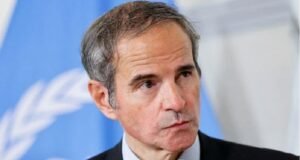
A suicide bombing that struck inside a mosque at a police and government compound in northwest Pakistan reflects “security lapses,” current and former officials said as the death toll from the devastating blast climbed to 100 on Tuesday, reports AP.
The blast, which ripped through a Sunni mosque inside a major police facility in the city of Peshawar, was one of the deadliest attacks on Pakistani security forces in recent years. It left as many as 225 wounded, some still in serious condition in hospital, according to Kashif Aftab Abbasi, a senior officer in Peshawar.
More than 300 worshippers were praying in the mosque, with more approaching, when the bomber set off his explosives vest on Monday morning, officials said.
The explosion blew off part of the roof, and what was left soon caved in, injuring many more, according to Zafar Khan, a police officer. Rescuers had to remove mounds of debris to reach worshippers still trapped under the rubble.
More bodies were retrieved overnight and early Tuesday, according to Mohammad Asim, a government hospital spokesman in Peshawar, and several of those critically injured died. “Most of them were policemen,” Asim said of the victims.
Bilal Faizi, the chief rescue official, said rescue teams were still working Tuesday at the site as more people are believed trapped inside. Mourners were burying the victim at different graveyards in the city and elsewhere.
Counter-terrorism police are investigating how the bomber was able to reach the mosque, which is in a walled compound, inside a high security zone with other government buildings.
“Yes, it was a security lapse,” said Ghulam Ali, the provincial governor in the Khyber Pakhtunkhwa province, of which Peshawar is the capital.
Abbasi, the official who gave the latest casualty tolls, concurred. “There was a security lapse and the inspector-general of the police has set up an inquiry committee, which will look into all aspects of the bombing,” he said. “Action will be taken against those whose negligence” caused the attack.
Talat Masood, a retired army general and senior security analyst said Monday’s suicide bombing showed “negligence.”
“When we know that Tehreek-e-Taliban Pakistan is active, and when we know that they have threatened to carry out attacks, there should have been more security at the police compound in Peshawar,” he told The Associated Press on Tuesday, referring to a militant group also known as the Pakistani Taliban or TTP.
Kamran Bangash, a provincial secretary-general with opposition party Pakistan Tehreek-e-Insaf called for an investigation and said Pakistan will continue to face political instability so long as the current government is in power.
“The current government of Prime Minister Shahbaz Sharif has failed to improve the economy and law and order situation, and it should resign to pave the way for snap parliamentary elections,” he said.
The military’s media wing declined an Associated Press interview request for the chief of army staff. Asim Munir, who took office in November, has yet to do any media appearances.
Sharif visited a hospital in Peshawar after the bombing and vowed “stern action” against those behind the attack. “The sheer scale of the human tragedy is unimaginable. This is no less than an attack on Pakistan,” he tweeted.
On Tuesday he dismissed criticism of his government and call for unity.
“Through their despicable actions, terrorists want to spread fear & paranoia among the masses & reverse our hard-earned gains against terrorism & militancy,” he tweeted. “My message to all political forces is one of unity against anti-Pakistan elements. We can fight our political fights later.”
Authorities have not determined who was behind the bombing. Shortly after the explosion, TTP commander Sarbakaf Mohmand claimed responsibility for the attack in a post on Twitter.
But hours later, TTP spokesperson Mohammad Khurasani distanced the group from the bombing, saying it was not its policy to target mosques, seminaries and religious places, adding that those taking part in such acts could face punitive action under TTP’s policy. His statement did not address why a TTP commander had claimed responsibility for the bombing.
 Weekly Bangla Mirror | Bangla Mirror, Bangladeshi news in UK, bangla mirror news
Weekly Bangla Mirror | Bangla Mirror, Bangladeshi news in UK, bangla mirror news







